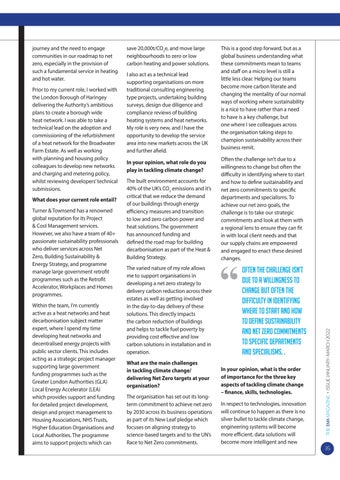Prior to my current role, I worked with the London Borough of Haringey delivering the Authority’s ambitious plans to create a borough wide heat network. I was able to take a technical lead on the adoption and commissioning of the refurbishment of a heat network for the Broadwater Farm Estate. As well as working with planning and housing policy colleagues to develop new networks and charging and metering policy, whilst reviewing developers’ technical submissions. What does your current role entail? Turner & Townsend has a renowned global reputation for its Project & Cost Management services. However, we also have a team of 40+ passionate sustainability professionals who deliver services across Net Zero, Building Sustainability & Energy Strategy, and programme manage large government retrofit programmes such as the Retrofit Accelerator, Workplaces and Homes programmes. Within the team, I’m currently active as a heat networks and heat decarbonisation subject matter expert, where I spend my time developing heat networks and decentralised energy projects with public sector clients. This includes acting as a strategic project manager supporting large government funding programmes such as the Greater London Authorities (GLA) Local Energy Accelerator (LEA) which provides support and funding for detailed project development, design and project management to Housing Associations, NHS Trusts, Higher Education Organisations and Local Authorities. The programme aims to support projects which can
save 20,000t/CO2e, and move large neighbourhoods to zero or low carbon heating and power solutions. I also act as a technical lead supporting organisations on more traditional consulting engineering type projects, undertaking building surveys, design due diligence and compliance reviews of building heating systems and heat networks. My role is very new, and I have the opportunity to develop the service area into new markets across the UK and further afield. In your opinion, what role do you play in tackling climate change? The built environment accounts for 40% of the UK’s CO2 emissions and it’s critical that we reduce the demand of our buildings through energy efficiency measures and transition to low and zero carbon power and heat solutions. The government has announced funding and defined the road map for building decarbonisation as part of the Heat & Building Strategy. The varied nature of my role allows me to support organisations in developing a net zero strategy to delivery carbon reduction across their estates as well as getting involved in the day-to-day delivery of these solutions. This directly impacts the carbon reduction of buildings and helps to tackle fuel poverty by providing cost effective and low carbon solutions in installation and in operation. What are the main challenges in tackling climate change/ delivering Net Zero targets at your organisation? The organisation has set out its longterm commitment to achieve net zero by 2030 across its business operations as part of its New Leaf pledge which focuses on aligning strategy to science-based targets and to the UN’s Race to Net Zero commitments.
This is a good step forward, but as a global business understanding what these commitments mean to teams and staff on a micro level is still a little less clear. Helping our teams become more carbon literate and changing the mentality of our normal ways of working where sustainability is a nice to have rather than a need to have is a key challenge, but one where I see colleagues across the organisation taking steps to champion sustainability across their business remit. Often the challenge isn’t due to a willingness to change but often the difficulty in identifying where to start and how to define sustainability and net zero commitments to specific departments and specialisms. To achieve our net zero goals, the challenge is to take our strategic commitments and look at them with a regional lens to ensure they can fit in with local client needs and that our supply chains are empowered and engaged to enact these desired changes.
“
Often the challenge isn’t due to a willingness to change but often the difficulty in identifying where to start and how to define sustainability and net zero commitments to specific departments and specialisms. .
In your opinion, what is the order of importance for the three key aspects of tackling climate change – finance, skills, technologies. In respect to technologies, innovation will continue to happen as there is no silver bullet to tackle climate change, engineering systems will become more efficient, data solutions will become more intelligent and new
THE EMA MAGAZINE • ISSUE JANUARY–MARCH 2022
journey and the need to engage communities in our roadmap to net zero, especially in the provision of such a fundamental service in heating and hot water.
35






